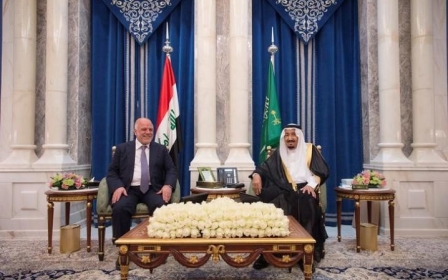Iran-backed Shia leader among Iraqi delegation to Saudi Arabia

A leading figure in Iraq's Shia military forces, knowns as the Popular Mobilisation Units, accompanied Iraqi Prime Minister Haider al-Abadi during his visit to Saudi Arabia on Monday, according to reports.
Iraq and Saudi Arabia announced in a joint statement following their meeting that they are setting up a coordination council to upgrade strategic ties as part of an attempt to heal troubled relations between the Arab neighbours.
In a joint statement released after the visit, the countries said they had achieved a "quantum leap" in bilateral relations and stressed the importance of further official visits.
The visit came amid an ongoing Gulf crisis since Saudi Arabia, the UAE, Bahrain and Egypt severed diplomatic relations with Qatar on 5 June, accusing it of supporting militants and Iran - charges that Doha has denied.
Photos and a video shared on social media showed PMU leader Qassem al-Araji, who was appointed Iraq’s minister of interior in January, shaking hands with the Saudi crown prince and interior minister, Mohammed bin Nayef.
In one tweet, Araji appeared to be sitting with Abadi and the Saudi crown prince in a Saudi royal palace.
Translation: The shot that antagonised Iran. The lion of the Sunnis, Nayef, with the leader of the group, Abadi, along with Ibrahim Jaafari from the Dawa Party and Qassem al-Araji, leader of the Badr militia.
The PMUs are Shia-dominated, and a number have links to Iran’s Iran's Revolutionary Guards Corps and its Quds Force, led by commander General Qassem Soleimani.
Araji, who was born in the southern Iraqi city of Kut, moved to Iran for a few years after the Iranian Revolution, and became a commander of the Quds Force, reported al-Arabiya news.Iraq’s parliament voted in November last year to integrate the controversial PMUs into the country’s armed forces.
All the Shia blocs in the Iraqi parliament approved the measure, but many Sunni politicians, who have long accused the PMUs of engaging in sectarian reprisals against Sunni citizens, boycotted the session at the time.
The announcement came as the Iraqi military and its allies prepared to launch an assault on Islamic State fighters in the northern city of Mosul last July.
Human Rights Watch has accused fighters with the PMUs of secretly abducting men fleeing the Mosul fighting and keeping them in unidentified detention centres for interrogation.
During the recent assault to liberate the city of Fallujah, the PMUs were prevented from entering the centre of the city for fear of sectarian reprisals.
Middle East Eye propose une couverture et une analyse indépendantes et incomparables du Moyen-Orient, de l’Afrique du Nord et d’autres régions du monde. Pour en savoir plus sur la reprise de ce contenu et les frais qui s’appliquent, veuillez remplir ce formulaire [en anglais]. Pour en savoir plus sur MEE, cliquez ici [en anglais].




